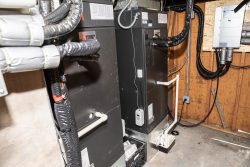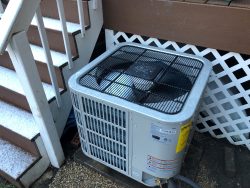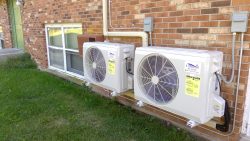
Heat pumps are one of the hottest trends on the market right now. Case in point: According to the International Energy Agency (IEA), last year, heat pump sales exceeded those of traditional furnaces. The heating and cooling capabilities that a heat pump provides year-round — not to mention the reductions in energy usage — suggest they are here to stay!
At ComEd, we support customers who decide to transition to cleaner energy sources and believe every customer should have the tools and information they need to make that transition a reality.
Whether they are curious about how heat pumps work or trying to decide if it is the right fit for them and their home, Pauravi Shah, senior energy efficiency program manager, can explain the technology and help them understand how energy efficient heating and cooling systems can reduce usage and overall energy costs.
Below, Pauravi answers some common customer questions about heat pumps.
Q. What is a heat pump?
A. A heat pump is a Heating, Ventilation, and Air Conditioning (HVAC) appliance that provides both cooling and heating for a building/home. It is a more efficient air conditioner that works in both directions to also provide heating.

Photo Credit: ComEd’s Whole Home Electrification (WHE) Program.
Q. How do heat pumps work? Does it only pump heat?
A. Heat pumps do not only pump heat; they also work in reverse to provide cooling. Heat pumps are a two-in-one HVAC system. In the cooling mode, the appliance is, in a technical sense, still pumping heat. It is removing heat from your house, similar to how a refrigerator works.
The most common type of heat pump, an air-source heat pump, works by transferring heat from the outside air to your home during the winter, and transferring heat from inside the home to the outside during the summer, just like an air conditioner.
Q.What are the benefits of a heat pump? Why is it so efficient?
A.Heat pumps are so efficient because rather than generating heat through combustion like a natural gas or propane furnace or boiler, they transfer heat. Transferring heat requires less energy than generating it.
Heat pumps also come in many different configurations to suit your home’s unique needs including centrally ducted, ductless mini-split, and hybrid systems that work in tandem with a gas furnace.
The dual fuel hybrid system can potentially be a good economic solution for customers that currently have gas furnaces, because when the temperatures outside dip, and the heat pump starts to lose efficiency, the system can be switched to the gas furnace to provide heat instead.
Q. Do heat pumps work in the cold northern Illinois winters? How do heat pumps pull heat from cold air in the winter?
A. Yes, heat pumps can work in colder climate regions like the upper Midwest and the Northeast.
As temperatures get colder in the winter months, there is less heat to pull from the outside air, but cold-climate heat pumps are designed to perform in low temperatures and continue making your home comfortably warm.
If a customer has an existing gas furnace in the home, the heat pump can be installed as a hybrid (dual fuel) system where the heat pump and gas furnace operate in tandem.
Heat pumps can be installed in several different configurations depending on the home and existing HVAC system.

Heat pump during the cold season
Q. Are there advantages or disadvantages to having a heat pump?
A. When in heating mode, a customer can save a lot of money compared to traditional electric heating and propane (LPG). Heat pumps will run on clean electricity from renewable sources. So, as the supply of clean energy on the grid increases over time, heat pumps are much better for the environment compared to fossil fuel alternatives.
For customers that currently use natural gas or propane for heating their home, it is important to analyze electric and gas rates during the heating season to determine whether they want to switch to an all-electric system or a hybrid (dual fuel) one in which the heat pump and gas furnace operate in tandem.
In a dual fuel system, this analysis will help determine the best temperature at which the customer should switch over from the heat pump to the gas furnace. Contractors can help customers calculate the switch-over temperature that would allow the customer to save the most money on their overall energy bills.
Q. Are they hard to maintain?
A. Maintaining a heat pump is like maintaining any heating and cooling equipment. A service technician should service your heat pump at least once every year.
To keep the system operating properly, you must regularly change filters and clean coils and fans when they appear dirty to ensure airflow is not hindered. You should also keep the heat pump free of debris to promote air flow, as reduced air flow impacts performance and can damage system components.
It is also important to keep outdoor units clear of ice and snow during the winter. Maintaining your heat pump will ensure that it lasts long and operates as efficiently as possible.

Heat pump mini split
Q. Are they expensive?
A. Price varies by product type and efficiency ratings, but heat pumps can be slightly more expensive than new air conditioners and furnaces. However, home weatherization upgrades can reduce the size of the high-efficiency heat pump required and save customers money on energy bills over time.
Also, incentives are available for the purchase of a heat pump. ComEd offers discounts of up to $2,000 on an air source heat pump, and there are federal tax credits of up to 30% of the installation cost. More information on the heat pump tax credit and other federal incentives can be found on the U.S. Department of Energy’s Energy Savings Hub.
Q. Would you recommend a heat pump to others?
A. It’s important that customers consider if heat pumps, and other all-electric technologies, are right for them. However, if they are looking for ways to save energy, reduce their carbon footprint, and potentially save money on their overall energy bills –this is certainly a great option!
Summer is the time when customers typically purchase new air conditioners — so this is the perfect time to consider purchasing a heat pump. Many customers realize significant bill savings by replacing an air conditioner with a heat pump. In this scenario, the heat pump efficiently provides all home cooling as well provides a portion of the heating during the colder months, in tandem with the home’s existing natural gas or propane furnace. For homes with electric heating, the savings can be even greater!
Q. Between electrical vehicles (EVs) and heat pumps, it seems that electric technologies are on the rise in ComEd’s territory and across the state. Why is it so important for customers to consider these new cleaner technologies?
A. Taking action to significantly reduce carbon emissions is a central tenet of the state of Illinois’ landmark Climate and Equitable Jobs Act (CEJA).
In fact, the state is calling for action to significantly reduce carbon emissions by 2050, which includes a near-term goal of adding 1 million EVs to the roads by 2030.
Beyond electrification of our transportation, we know that buildings and homes are a significant contributor to fossil fuel emissions in our state and nationwide. Heat pumps offer an immediate way to reduce reliance on fossil fuels, which will enhance air quality across our communities.
Early efforts to electrify homes through the installation of heat pumps and other comprehensive measures are paying off for customers in targeted programs that helps save them hundreds of dollars annually on energy costs, while also reducing energy usage and improving air quality in their community.
ComEd is dedicated to supporting any customer looking to reduce their carbon footprint with an expanding array of offerings to help you make informed decisions, whether it’s integrating a heat pump into their home or taking advantage of other environmentally beneficial technologies like electric vehicles and solar. ComEd is here to help!
